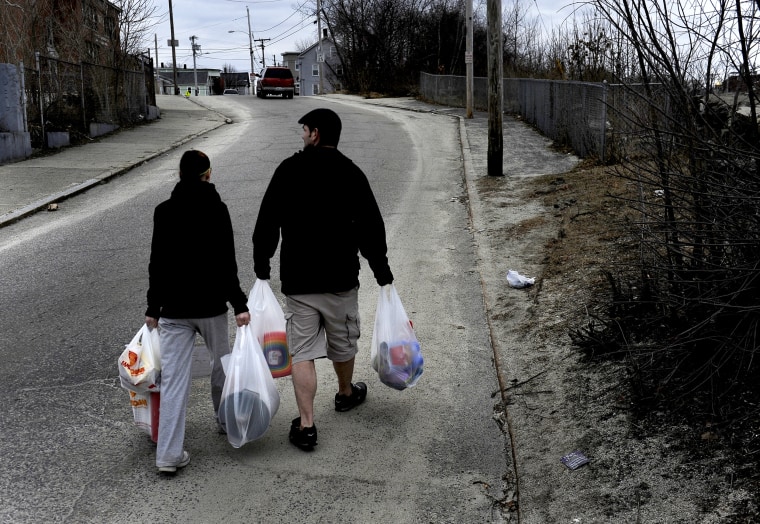Growing up in New Jersey, chef Cesar Zapata remembers his Colombian parents’ struggle to put food on the table even though both of them held down two jobs.
His mother eventually enrolled him in SNAP, or food stamps, a federal assistance program that provides supplemental aid to help qualifying low-income families buy food.
Now an established chef in Miami, Zapata said SNAP allowed his parents to pay bills and rent and still be able to feed their family.
“That’s why it’s so important to continue to advocate and to continue to fight to make sure that programs like SNAP exist,” said Zapata, who is also a leadership council member at No Kid Hungry, a nonprofit organization.
Many Latinos, particularly eligible children in immigrant households, have not been taking advantage of health and food assistance benefits like SNAP out of fear of a rescinded Trump-era rule. The "public charge" rule made it harder for people to get citizenship or legal residency if family members used certain government programs.
SNAP participation among children who are U.S. citizens living in mixed immigration status households dropped by nearly 23 percent from 2018 to 2019, according to an analysis from the Food Research and Action Center, nonprofit organization.
No Kid Hungry and UnidosUS, the country’s largest Latino civil rights and advocacy organization, announced a partnership on Wednesday alongside a bilingual campaign to encourage and help more families enroll in SNAP.
Both groups estimate that more than 4 million SNAP-eligible Hispanics have not enrolled in the program, which advocates and experts have long considered a powerful tool to reduce food insecurity and child poverty.
Three out of 4 immigrant families were unaware that the Trump-era “public charge” rule stopped being enforced after President Joe Biden took office, according to a survey funded by No Kid Hungry.
“We need to continue to increase the benefits that these programs provide us,” Zapata said at a news conference Wednesday.
At the same time, the Biden administration implemented the largest permanent increase in SNAP benefits in the program’s history several months ago. In October, the average monthly SNAP benefit for an individual increased by $36.24 after a cost adjustment to reflect changes in the food marketplace and consumers’ circumstances, according to the Agriculture Department.
'A chilling effect'
The discretionary rule known as "public charge" has long been used to determine whether an immigrant is considered likely to rely on certain public assistance programs.
The Department of Homeland Security previously defined a “public charge” as someone who depended on cash assistance or government-funded long-term institutional care.
The Trump administration expanded the definition to include benefits such as food stamps, nonemergency Medicaid, certain prescription drug subsidies and housing vouchers — effectively penalizing families who have members in the process of getting green cards or becoming U.S. citizens for using such public programs.
Quickly after having stepped into office, Biden issued an executive order directing the Department of Homeland Security to stop enforcing Trump's "public charge" rule immediately to curb its “chilling effect.”
Almost 28 percent of immigrants in families with members who did not have green cards missed out on an array of public benefits they were eligible for, according to a study from the Urban Institute, an economic and social policy think tank.
A rise in Latino families facing hunger
Against that backdrop, food insecurity rose among Latinos during the pandemic.
"More than 1 in 5 Latino families with children faced hunger in 2020, a 28 percent rise from 2019," Monica Gonzales, the director of federal government relations at No Kid Hungry, said at a news conference Wednesday.
As the pandemic persists amid a rise in food and grocery costs, 1 in 6 children may continue to face hunger, according to No Kid Hungry and UnidosUS.
The Biden administration is officially changing the "public charge" definition, proposing to limit it to participation in income assistance programs, such as Supplemental Security Income and Temporary Assistance for Needy Families, as well as long-term government-funded institutionalization.
According to Homeland Security Secretary Alejandro Mayorkas, the proposed definition would help "return to the historical understanding of the term ‘public charge’ and individuals will not be penalized for choosing to access the health benefits and other supplemental government services available to them.”
The American College of Emergency Physicians, which represents 40,000 emergency medicine physicians, said the revised policy “will ensure millions of Americans no longer have to make the extremely difficult choice” of forgoing the chance to become U.S. citizens or receive benefits.
The proposed rule is expected to go into effect sometime after April 25, when the 60-day public comment period on the new language ends.
Follow NBC Latino on Facebook, Twitter and Instagram.

